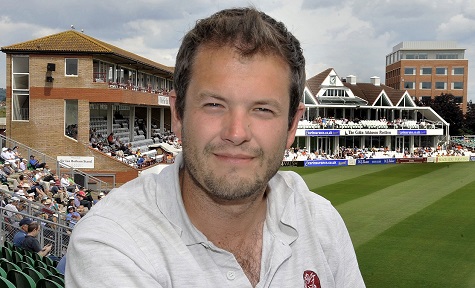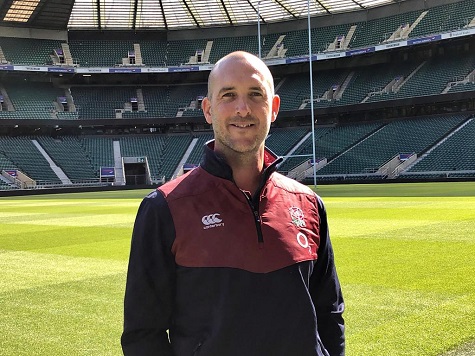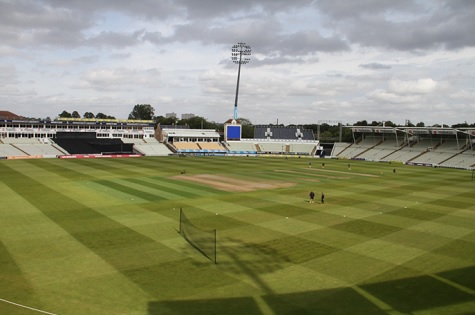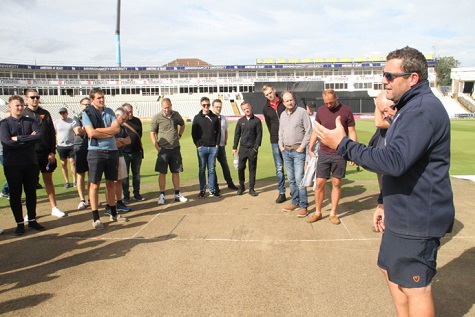Before I get on to this week’s blog I would like to congratulate both Simon Lee and Jim Buttar on their recent appointments, becoming head groundmen at two iconic venues.
With Simon taking up the role at Southampton (Hampshire CCC) and Jim at Twickenham Stadium home of the RFU, I shall look forward to meeting both of them sometime in the near future.

Simon Lee

Jim Buttar
On the subject of recruiting, this week’s blog looks at the challenge many companies face when recruiting new staff. Having myself moved jobs on several occasions, I know only too well many of the issues both employee and employer face when seeking new staff.
Each and every sport facility has its own requirements that are driven by the expectations of the people who use it and the owners/ managers who run the facility.

Also, the reputation of any sports facility is based on the success of the team and players using it, combined with the quality and presentation of the playing surface and its ability to recover quickly after use. This can only be achieved if there is a significant level of investment in machinery, staff and resources over time.
The priority is for the employer to identify the calibre and skillset of the candidate they want to employ. To do this they first need to know the current condition of their facilities and how they can be improved. This can only be achieved if they have a 5-10 year business plan in place that has identified the current strengths and weaknesses of the facility and has a development programme to achieve their goals and ambitions, which needs to be sustainable and successful over time.
Recruiting a new member of staff is not always an easy task. Trying to find someone to move to your location, accept your working regimes and salary, plus fit in with existing members of staff, is often quite challenging.

Most who apply, will or should have the appropriate skills and experience to do the job. The key requirement will be that they have the right personality and motivation skills to fit in with your culture and bring in new, efficient ways of working.
What is the point of appointing a new person if you are not going to support them with the appropriate investment to enable them to deliver what they promised in their interview?
As mentioned in a previous blog, the issues we face in the coming years regarding recruiting the next generation of greenkeepers/ groundsmen is manifold.
A recent conversation with a premiership head groundsman, stated that he was finding it hard to recruit new staff, mainly on the basis that most did not want to work weekends and bank holidays. So what does that tell us? Many of the next generation have preconceived ideas of what job they want, expecting a high salary for little inconvenience.
Grass does not stop growing at weekends and most sporting fixtures happen to fall on a weekend / evening!
Even the process of recruitment has changed immensely since I started out. Back then most jobs were not even advertised. We generally found out by word and mouth or were recommended the job by someone we knew. Today using the internet, we can see at a glance a plethora of jobs available via recruitment websites such as Indeed, jobs search sites, industry magazines such as our own, apps, sports governing bodies, individual companies, Facebook, Twitter and LinkedIn.
However, there still needs to be a valid, thorough interview process to enable both parties to be sure of what they are taking on when agreeing a new appointment.
Today’s groundsmen need to be a jack of all trades, utilising many skills, with the ability to use modern aides and technologies to deliver the expectations of ever-demanding clients and owners. He or she needs to be a plant pathologist, mechanic, chemist, mathematician, IT literate, a good communicator, flexible and have good people skills.

Most, if any, of these skills can only be assessed and attained via a good interview process which will be dictated by the size and scale of the job in question. Yes, many applicants can be whittled down by paper and questionnaire assessments, but the real value is in the final interview stages when candidates can express themselves via an interview panel of two or three people and a walk / talk opportunity around the pending facility.
I also find it astounding that some interview panels rarely have anybody on the team that has done the job or indeed has an affinity with the job or understands the role on offer?! Which is why I believe, quite often the wrong appointment has been made.
I personally experienced this when I was working in the local government sector where I witnessed a number of appointments that went drastically wrong - mainly due to the fact that these appointed staff had no affinity with the service sector that they were employed to manage. Quite often it was worst when people were transferred from one department to another. It was even more acute when a lot of landscape sectors where being taken over by litter and road service departments - often causing a lot of conflict between staff members.
The worrying fact for me is that a lot of the traditional parks and open space management skills are being lost and eroded away by these ongoing staff / departmental changes we have seen in recent years.
Getting the right person for the job is key. The only way to ensure you do this is to invest in a decent recruitment process, especially when interviewing for people to manage large numbers of staff and resources. It is now quite normal for companies and large organisations to enlist the help of a consultant / agronomist or a retired turf professional to sit on the interview panel to help them evaluate the potential candidates.
However, for me the biggest challenge facing our industry is indeed finding our next generation of groundmen / greenkeepers and parks managers who want to take up the mantel and responsibilities of managing and maintaining a magnificent array of prestigious sporting venues, parks and heritage sites.
We as an industry must now start to qualify the importance of the role of groundsman, greenkeepers and parks managers, educating and explaining the importance of their roles and responsibilities. We need a unified approach to promoting the work of these dedicated turf professionals that will entice the next generation to come and work in this unique industry.

I find it hard that many of our professional sporting facilities do not openly reward the hard work and dedication of their grounds staff. As a fellow magazine editor pointed out, why don’t these professional clubs publicly promote what they do? We rarely see any groundsman being interviewed by the press and TV companies when covering a major sporting event. Without their input of skills and expertise these playing surfaces would not be fit for purpose and contribute to the spectacle we see at a major sporting event.
The likes of Neil Stubley at Wimbledon, Karl McDermott at Lords, Gary Barwell at Edgbaston, Keith Kent, Dave Roberts, John Ledwidge Darren Baldwin and many other Premiership groundsmen and top greenkeepers would relish the idea of being interviewed about their role in producing a playing surface for a major event. I am sure it would make good viewing and at the same time promote our wonderful sports turf industry.
We as an industry, as I have mentioned before, should have our own equivalent of a national Red Nose / Children in Need type day to raise the profile and put our industry in the spotlight.
I am sure between the IOG, BIGGA, major manufacturers and all the trade magazines and journals, could arrange a collective awareness day to celebrate our industry.
We could nominate a day in the year, where every groundman, greenkeeper, parks manager, gardener in fact anybody who works in the industry does something silly or amusing to raise money for our nominated charity. We really need a national campaign to entice the next generation.